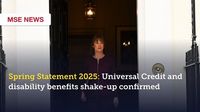In a major overhaul of the welfare system, the UK government has announced that over 800,000 disabled individuals will be denied access to Personal Independence Payment (PIP) benefits in the coming years. This announcement was made by the Department of Work and Pensions (DWP) on March 26, 2025, following a detailed analysis of the welfare reforms initially presented by Liz Kendall on March 18 and later confirmed by Rachel Reeves during her spring statement.
The DWP's impact assessment reveals that the tightening of PIP eligibility criteria will result in 370,000 current recipients losing their benefits during their award reviews. An additional 430,000 individuals who would have qualified under the existing rules will also be excluded from receiving PIP under the new regulations. On average, these claimants will face a loss of £4,500 per year, significantly impacting their financial stability.
Furthermore, the proposed changes to the broader benefits system are projected to push approximately 250,000 individuals, including 50,000 children, into relative poverty by the fiscal year 2029/30. While the government has pledged to invest £1 billion annually starting in 2026-27 to assist those with disabilities and long-term health conditions in securing employment, critics argue that this will not offset the immediate hardships caused by the cuts.
Under the new PIP regulations set to take effect in November 2026, individuals claiming the daily living component will need to score a minimum of four points in a single activity during their assessment to qualify for support. Currently, claimants must achieve at least eight points across multiple activities, which include essential daily tasks such as preparing food and personal hygiene. This change is expected to disproportionately affect individuals with autism, ADHD, and mental health conditions, as highlighted by the charity Sense, which described the cuts as "draconian".
In response to the changes, James Watson-O’Neill, chief executive of Sense, emphasized that PIP was designed to help disabled individuals manage the extra costs of living with a disability, which often enables them to maintain employment. The charity has expressed deep concern over the implications of the new eligibility criteria.
Additionally, the DWP plans to streamline the PIP assessment process, which has faced criticism for being undignified and inaccessible. The government intends to record assessments to establish trust in the system, and if individuals claim both PIP and Universal Credit, they will only need to undergo one assessment, as the work capability assessment for Universal Credit will be eliminated by 2028.
Another significant change is the scrapping of the previously proposed PIP voucher system, which would have required claimants to use vouchers instead of direct bank transfers. This idea faced backlash from various disability advocacy groups, who deemed it dehumanizing.
Despite these changes, the government has assured that PIP will not be frozen or means-tested, and payments will continue to rise in line with inflation. However, the ramifications of the cuts have led to widespread condemnation from charities and advocacy groups, who warn that these measures will only exacerbate poverty and health issues among disabled individuals.
The announcement has sparked a fierce debate in Parliament, with Labour MPs and various charities criticizing the government for what they perceive as cruel cuts to vital support systems. Richard Burgon, a former shadow Treasury minister, remarked, "Making cuts instead of taxing wealth is a political choice, and taking away the personal independence payments from so many disabled people is an especially cruel choice."
Debbie Abrahams, chair of the Work and Pensions Committee, echoed these sentiments, stating that the evidence suggests the cuts will lead to increased poverty and worsened health conditions. She questioned how making people poorer would contribute to economic growth or employment.
Meanwhile, the Resolution Foundation has estimated that the tightening of PIP eligibility could result in a loss of support for between 800,000 and 1.2 million people by the end of the decade, with annual losses ranging from £4,200 to £6,300. The foundation's chief executive, Ruth Curtice, emphasized the need for transitional protections for those facing income shocks due to the reforms.
As the government implements these sweeping changes, there is a growing concern among disabled communities and their advocates about the future of welfare support in the UK. The proposed reforms are viewed as a significant regression in the support available to some of the country’s most vulnerable citizens, raising questions about the moral implications of such cuts.
In light of these developments, many are left wondering how the government plans to balance fiscal responsibility with the need to protect those who rely on these essential benefits. As the situation unfolds, the impact of these changes on disabled individuals and their families will be closely monitored by both supporters and critics alike.









